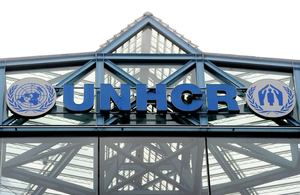UNHCR Standing Committee 68th session: UK statement
This statement was delivered during the 68th session of the UNHCR Standing Committee on 14 March 2017.

UNHCR is headquartered in Geneva
Madam Chair, thank you very much for the update on Africa. Like others we are very concerned by the current situation, particularly rising food insecurity and famine. As the Deputy High Commissioner set out, in 2017 the Humanitarian Sector faces challenges unlike any in recent history. Famine in South Sudan, drought in Somalia, intractable conflict in Yemen and Syria and excess child malnutrition in North Eastern Nigeria mean the sector is under increasing strain.
In this context the world needs UNHCR more than ever. We are witnessing the largest number of people migrating because of fear, violence and persecution since the last World War. We need UNHCR to be the best it can be. It is critical that the international community steps up to the challenge, raising the visibility of crises and resources required. The UK has committed to 0.7% GNI and our proportion of ODA spent on humanitarian crises is increasing.
It remains key that UNHCR delivers on its Grand Bargain commitments, notably on cash transfers, accountability to affected populations and transparency, and it is good to see progress being made.
We know UNHCR are working more closely with development actors to deliver durable solutions for people trapped in protracted crises, and we are very supportive of this. Most refugees are unable to return home quickly. 80% of refugee crises last for ten years or more. Giving people the ability to integrate into regional economies will help to reduce the ‘pull’ of a dangerous journey across continents.
To deliver this we need a UN humanitarian system working closely together, particularly UNHCR working closely with OCHA to deliver on commitments to have more predicable engagement with IDPs
The Comprehensive Refugee Response Framework (CRRF) and the Global Refugee Compact are major opportunities to strengthen protection and deliver more sustainable solutions for refugees and for host communities.
This is not the time for business as usual or the long term expansion of existing programmes. We hope UNHCR will foster new types of partnership and programmes which deliver:
- improved coordination around refugees in each country, incorporating the needs of refugees into national development plans;
- support to host governments to help improve their legislative and policy frameworks;
- collaboration between a broader range of partners with new forms of expertise and technical assistance to deliver longer-term support, and opportunity to refugees to complement short-term humanitarian assistance; and
- more and new types of financing and new third resettlement countries.
We know this work has started and appreciate UNHCR’s leadership on these issues.